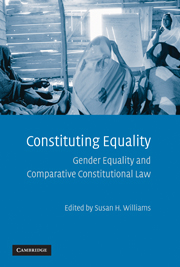Book contents
- Frontmatter
- Contents
- List of Contributors
- Acknowledgments
- CONSTITUTING EQUALITY
- Introduction: Comparative Constitutional Law, Gender Equality, and Constitutional Design
- SECTION ONE STRUCTURE
- SECTION TWO RIGHTS
- 3 More than Rights
- 4 Perfectionism and Fundamentalism in the Application of the German Abortion Laws
- 5 Moral Authority in English and American Abortion Law
- SECTION THREE CULTURE/RELIGION AND GENDER EQUALITY
- SECTION FOUR CONSTITUTIONS AND INTERNATIONAL LAW
- SECTION FIVE WOMEN IN THE PROCESS OF CONSTITUTION MAKING
- Conclusion: Gender Equality and the Idea of a Constitution: Entrenchment, Jurisdiction, and Interpretation
- Index
- References
3 - More than Rights
Published online by Cambridge University Press: 26 October 2009
- Frontmatter
- Contents
- List of Contributors
- Acknowledgments
- CONSTITUTING EQUALITY
- Introduction: Comparative Constitutional Law, Gender Equality, and Constitutional Design
- SECTION ONE STRUCTURE
- SECTION TWO RIGHTS
- 3 More than Rights
- 4 Perfectionism and Fundamentalism in the Application of the German Abortion Laws
- 5 Moral Authority in English and American Abortion Law
- SECTION THREE CULTURE/RELIGION AND GENDER EQUALITY
- SECTION FOUR CONSTITUTIONS AND INTERNATIONAL LAW
- SECTION FIVE WOMEN IN THE PROCESS OF CONSTITUTION MAKING
- Conclusion: Gender Equality and the Idea of a Constitution: Entrenchment, Jurisdiction, and Interpretation
- Index
- References
Summary
INTRODUCTION
If asked what should be done to constitutionalize gender equality, most people are likely to propose a constitutional provision for gender equality. Undoubtedly, there would be variations in the form suggested for this provision. It might be expressed “negatively;” that is, as a prohibition on laws that discriminate with respect to “sex” and/or “gender.” Or, it might be positive, asserting the right of women and men to equality. It might be broad and generalized, prohibiting arbitrary or unreasonable discrimination across a range of classifications, or alternatively, more closely tailored, with specific reference to women.
Some people might want to qualify a simple prohibition on laws that discriminate with respect to gender, to include other related bases for discrimination: sexuality, marital status, and pregnancy, among others. Still others, anxious about the prospect that formal equality provisions may be drawn on by the courts to invalidate laws or programs for substantive equality, will seek to add a provision quarantining affirmative action from the prohibition on gender discriminatory laws. However, whether or not with qualifications, it is reasonable to assume that most people would begin with a constitutional equality rights provision, and some would also end with it.
Feminists should question this approach. Before relying on a constitutional rights provision for achieving equality, or campaigning to amend a constitution to incorporate such a provision, they should proceed with eyes wide open. They should understand the “downside” of constitutional rights strategies.
- Type
- Chapter
- Information
- Constituting EqualityGender Equality and Comparative Constitutional Law, pp. 75 - 92Publisher: Cambridge University PressPrint publication year: 2009
References
- 2
- Cited by



